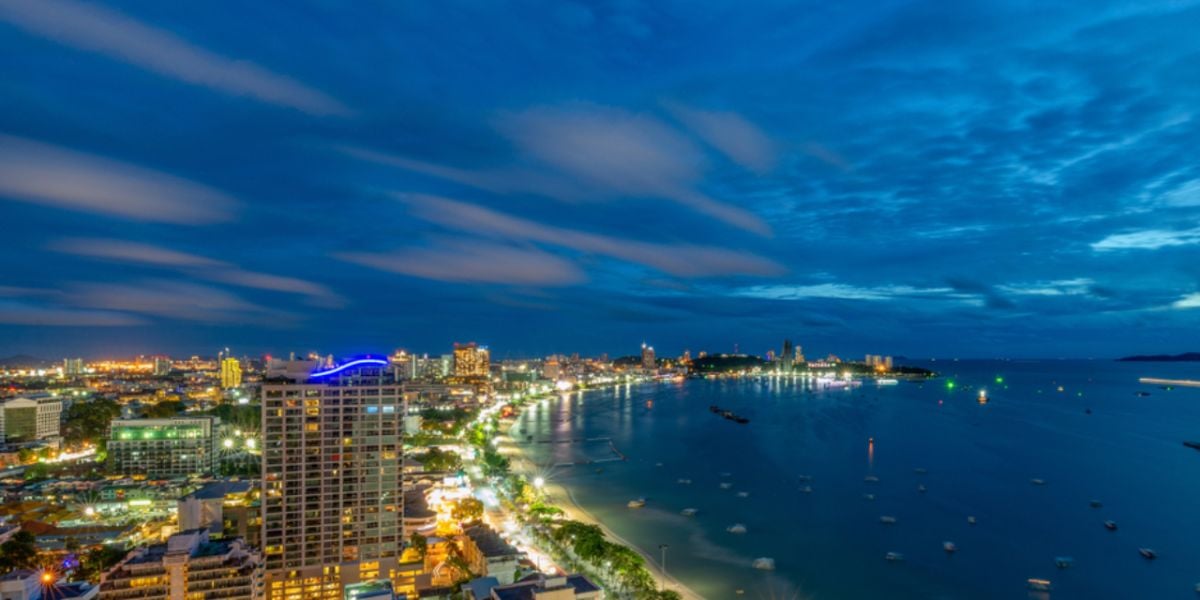
Pattaya boasts one of the most significant expatriate communities in Thailand. It has many international schools, good infrastructure, and a significant number of affordable luxury rentals. Rental costs in Pattaya tend to be lower than in Bangkok and Phuket, but as property is in demand along the eastern seaboard, it is not as cheap as in some other areas of the country.
The vibrant city is full of beaches and nightlife. It is a great destination for travelers to explore and for people who want to stay for long periods of time. However, before choosing the ideal area, make sure that you are aware of where to stay, as the town is a large area. Nevertheless, prices do vary depending on where you want to stay in Pattaya.
Accommodation in South and Central Pattaya may cost more than that in Jomtien and beyond, and Naklua in North Pattaya tends to have rather exclusive pockets.
As it is so popular with expats, there are plenty of expat-friendly services, and you will be sure to find comfortable accommodation with ease. From a property perspective, it is one of the most rapidly developing areas in the country.
Buy or rent in Pattaya
Most expats living in Pattaya opt for long-term rent. This is a much easier and often cheaper option for organizing your life in Pattaya.
Buying, on the other hand, is substantially more complicated. This is mainly because of a number of restrictions that apply to expats interested in investing in real estate in Thailand.
Foreigners are not allowed to own land outright in Thailand. However, Thai law allows foreigners to buy a condominium as long as they pay for it in foreign currency. Alternatively, foreigners will need to invest at least THB 40 million in the Thai economy to legally be able to purchase a private residence of up to 1,600m² in the country. Those wishing to buy or build their own house usually do so through their Thai spouse, business partner, or half-Thai children.
Due to these restrictions, many foreigners prefer to secure a long-term lease agreement. The law allows leases of up to 30 years, but if you sign a 30-year lease, make sure it is registered so that you will have recourse if your landlord tries to evict you before that time.
Important:
If you decide to purchase real estate in Thailand, you should consult with a lawyer and a real estate agent before making any final decisions.
Good to know:
Leases are only valid for three years if they are not registered at the Land Department.
Many leases contain renewal clauses that provide for a renewed 30-year lease once the initial 30-year period comes to an end. A renewal clause is a promise to renew a lease. Still, it is important to understand that it does not always mean an automatic renewal, as your landlord's cooperation is tantamount.
Types of accommodation in Pattaya
New development projects continue to bloom near and within the city, and there is a diverse choice of real estate in Pattaya. From condominiums to detached houses and villas, Pattaya boasts a sophisticated property industry. However, although there are residential houses available that can offer better value for money, the market is dominated by luxury condos.
There are some incredible luxury condos in Pattaya, which have fantastic sea views, that can cost up to THB 100,000 a month. However, on the increasingly busy eastern side of Pattaya, two-bedroom townhouses can be rented on a long-term basis for as little as THB 10,000 a month. It is also possible to rent a room for even cheaper and live on a tighter budget if you are willing to forego certain comforts.
As a general rule, small to medium-sized condos of about 60m² with basic furnishings start at about THB 12,000 to THB 15,000, and if you are looking for a two-bedroom condominium, you can expect to pay anywhere from THB 20,000 to THB 40,000. A large penthouse of 120m² will set you back about THB 60,000 a month.
Finding accommodation in Pattaya
Several property websites specialize in helping those who are looking for accommodation in Pattaya. So, once you have decided where you want to live – be that near the bustle of Beach Road, which is Pattaya's central strip, or out towards the emerald waters of nearby Jomtien, which provides some respite from Pattaya's nightlife – you can search online to see what is available.
There are many real estate agents in Pattaya, and finding an English-speaking agent is easy. However, it is important to check their background first, as some Pattaya real estate agents have been reported to act unethically and fraudulently. Note that if you do decide to rent a place via an agent in Pattaya, you will also need to budget for agent fees.
If you are already in Pattaya and have some time to spare before making your final decision on rent, you may want to explore different neighborhoods and see what you like. This will give you a better idea of the living environment and help you make a more informed decision. Plus, a lot of gated communities have management centers where you can easily enquire about rent prices and available renting options.
You can opt for furnished or unfurnished accommodation; unfurnished accommodation will be considerably cheaper. As furniture isn't particularly expensive in Thailand, especially if you buy local products, then choosing unfurnished accommodation could be a better option if you're looking to live in Thailand on a long-term basis. When you move into your new home, you should be sure to prepare your two-month advance and 1-month deposit amount and sign a contract with an inventory that lists all the furnishings provided and the general condition of the accommodation.
Note that if you use an agent to rent accommodation, you will also need to pay agent fees.
The most popular areas in Pattaya
Here is a brief summary to help you choose where to stay in the main areas of Pattaya. You can choose what best suits your lifestyle as there are two areas to choose from:
Pattaya Beach
This area has the most popular nightlife area known as Walking Street. Large numbers of nightclubs and bars across each other are present in this area.
Pattaya Beach is the best for those who love to party, are comfortable with the busy and bustling city feels, and want to have access to everything. The downside here is just that the main beach is often dirty and overcrowded. It's also not the best area for families or anyone looking for some peace and quiet
Jomtien
This area is more relaxed than the main city. It also has a long and pleasant beach, which is not overcrowded compared to Pattaya. Some tourist attractions, such as Buddha Mountain, floating markets, and cultural temples and museums, are present here.
Jomtien is a family-friendly place and is also the best for budget-conscious people as it is quite cheaper than Pattaya. The downside of staying here is that public transport is not that accessible, so if you opt to stay in Jomtien, it is advisable to have a car.
Pratumnak
Pratumnak Hill is also known as the Beverly Hills of Pattaya. If you have traveled around Thailand, you may have noticed that most smaller cities and towns have a hilly area where the main temple is typically located. Pattaya is not an exception, and you will find the Golden Buddha temple on Pratumnak Hill.
Pratumnak Hill is one of the greenest and cleanest areas of Pattaya, nestled at about 120 meters from sea level. It offers beautiful views of the city and is also home to the residence of a member of the revered Thai Royal Family. Needless to say, it's very safe, prestigious, and also expensive. Prices here start at around THB 20,000 for a one-bedroom condo and climb to THB 50,000 for a two-bedroom place.
Nakula
Nakula is a neighborhood to the north of Pattaya Beach. Here, you will find some of the nicest beaches in Pattaya, as well as quite a bit of sightseeing. Nakula is calm and a great option for families with children. With that, the neighborhood is very well-connected to other parts of Pattaya. There are also water parks and other activities in the area.
How to rent accommodation in Pattaya
Like in the rest of Thailand, to rent accommodation in Pattaya, you will usually need to provide a copy of your passport, a copy of your work permit, and proof of income. If you are renting a property through a real estate agency, you may be subject to a credit check and be required to provide a character reference from your employer.
Generally, rental agreements last for six months to one year. However, the duration of the lease and the rental price are negotiable with the owner and can start from three months. Generally, a lease and security deposit are all that is needed to secure property in Thailand. In most cases, you can expect to pay a two-month deposit along with the first month's rent. However, some Thai landlords request a three-month deposit. At the end of the lease, the deposit should be returned as long as the property and furnishings are in good condition. If you leave before the end date of your lease agreement, you will forfeit your deposit unless specified in the contract.
Take note that foreigners are not allowed to use their rented accommodation for commercial purposes and are not allowed to sublease either, as it is a violation of Thai law (Condo Act Sec 17.1 as follows):
"In the case where a space in the condominium is set aside as a place to carry out the business, the system on entering and exiting such area shall be specifically set up in order to prevent the disturbance on the peaceful enjoyment of the joint owners.
No person shall be permitted to engage in any trade transactions in the condominium except it is a trade transaction in the area of the condominium designated in accordance with paragraph one) that disallows condominiums and apartments for short-term renting".
Most accommodations in Thailand have basic features, such as air conditioning, a bed, and a closet. However, hot water isn't always standard in older dwellings. Accommodation without hot water is much cheaper, but if you cannot cope with it, you should enquire about it before moving in.
Paying bills in Pattaya
Unless specified in the lease agreement, water, gas, and electricity are not included and must be paid in addition to your monthly rent.
Before renting your accommodation, it is advisable to check that any outstanding utility bills have been fully paid by the previous tenant.
The most common way to pay bills in Pattaya and the rest of Thailand is at your nearest 7-Eleven convenience store that has a water tap or telephone sign on the door. If you live in a condominium, you can often pay at the front desk of the building for a charge. 7-Eleven stores are located everywhere and are open 24 hours a day. Moreover, if you are staying in an apartment, you usually pay it to the landlord directly. Most apartments also add a feed on the electricity compared to condominiums.
For day-to-day living needs, you will most likely need to buy a gas bottle and a water cooler. Tap water isn't safe to drink, so the most efficient way to get around this issue is to hire the services of a company that will deliver bottles of drinking water to your home on a weekly basis and remove empty bottles. Also, some apartments and condominiums do have water dispensers wherein you can refill your water jugs and bottles.
Useful links:
Bangkok.com – Pattaya
Tourism Thailand – Pattaya
Pattaya Realty
Thailand Property – Pattaya
We do our best to provide accurate and up to date information. However, if you have noticed any inaccuracies in this article, please let us know in the comments section below.








